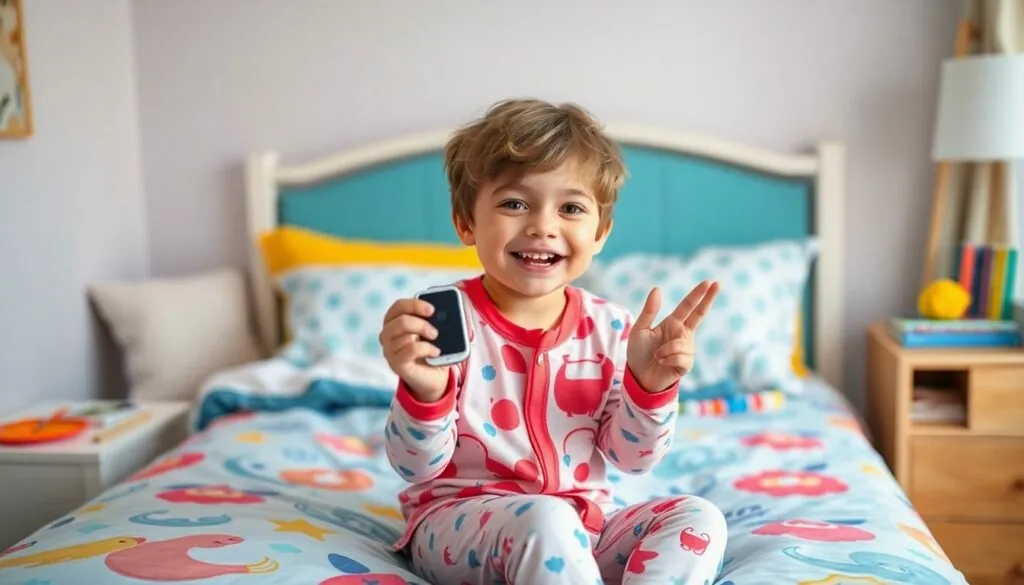Table of Contents
ToggleIn the hectic world of parenting, sleep often feels like a mythical creature—elusive and hard to catch. Enter the kids sleep tracker, a game-changing gadget that promises to turn bedtime chaos into a peaceful slumber party. Imagine knowing exactly how many hours your little one actually snoozes while you binge-watch your favorite show. It’s like having a sleep detective on your side, minus the trench coat and magnifying glass!
Overview of Kids Sleep Trackers
Kids sleep trackers monitor sleep patterns, helping parents understand their children’s rest habits. These devices usually record total sleep duration, sleep quality, and wake times. Advanced models often provide insights into sleep cycles, allowing for better sleep management.
Many trackers utilize sensors to gather data on movements during sleep, offering a detailed picture of sleep quality. Parents can access this information through accompanying mobile apps, which display trends and statistics for easy analysis. Customizable settings on these apps let families adjust reminders for bedtime and track progress over time.
Sizes of kids sleep trackers vary, accommodating preferences for wearables, smart shirts, or non-wearable monitors. Some options feature fun designs, maintaining children’s interest while they track their sleep.
Routine adjustments based on tracker data can improve sleep quality. By addressing factors like bedtime routines, environmental noise, or screen time before bed, parents can create optimal sleep conditions.
Experts indicate that establishing regular sleep schedules leads to better health and cognitive performance in children. Firms specializing in sleep technology continue to innovate, creating models that cater to different age groups and sleep needs. These advancements promote healthier sleep habits, ultimately benefiting both children and parents.
Benefits of Using a Kids Sleep Tracker
A kids sleep tracker provides several advantages for families aimed at improving children’s sleep habits. This device aids in creating an environment conducive to better rest.
Improved Sleep Quality
Improved sleep quality results from using a sleep tracker, as this technology helps identify sleep disruptions. Parents can analyze data on sleep duration and patterns. Recognizing these patterns allows parents to make informed adjustments to bedtime routines. Children often respond positively to consistent schedules, which the tracker helps facilitate. Sleep trackers may also reveal any environmental factors affecting sleep quality, such as noise or room temperature. Adapting to these insights can lead to deeper, more restorative sleep for kids. Ultimately, well-rested children exhibit enhanced mood and cognitive function during the day.
Enhanced Parental Insights
Enhanced parental insights emerge from tracking children’s sleep habits. This technology provides actionable data that parents can use as a reference point. Understanding sleep cycles and wake times allows for targeted interventions when necessary. Parents gain clarity on their children’s unique sleep needs, which can vary as they grow. With mobile apps linked to the trackers, monitoring trends becomes straightforward and accessible. These insights foster communication between parents and children about sleep expectations. Moreover, having accurate data supports parents in addressing external factors that may disrupt rest, further promoting healthy sleep practices.
Popular Kids Sleep Trackers on the Market
Several kids sleep trackers are available, offering unique features to assist parents in optimizing their children’s sleep. These devices range from wearables to non-wearable options, appealing to various preferences.
Product Features Comparison
Different kids sleep trackers come with specific features catering to diverse needs. Some models utilize sensors to monitor movements, providing insights into total sleep duration and the quality of rest. Mobile apps often accompany these devices, presenting data on sleep cycles and trends for easy analysis. Certain trackers include fun designs that engage children, making the experience enjoyable. Advanced options may even provide guidance on ideal bedtime routines based on collected data. Parents should consider each product’s features, ensuring they align with their child’s sleep requirements.
Pricing and Value
Pricing for kids sleep trackers varies significantly, impacted by features and brand reputation. Basic models can start around $30, while advanced devices may cost upwards of $150. Many parents find value in investing in more sophisticated trackers due to their enhanced data analysis and actionable insights. Warranty periods, customer support, and app functionalities play substantial roles in the overall value. Evaluating these trackers against their price points assists parents in making informed choices that suit their budget and children’s needs.
Tips for Choosing the Right Kids Sleep Tracker
Selecting the ideal kids sleep tracker requires careful consideration of several factors. First, consider the age of the child, as some devices suit specific age groups better than others. Look for trackers designed for comfort and practicality, ensuring they fit well into the child’s daily routine.
Assess features that align with family needs, such as movement monitoring or sleep cycle analysis. Advanced models often provide deeper insights into sleep quality, which can support informed adjustments to bedtime habits. Many devices integrate with mobile apps, allowing parents to visualize trends easily and access essential statistics on sleep patterns.
Evaluate design elements that appeal to children, as features like fun colors or characters can encourage them to wear the device consistently. Comfort matters; devices should feel natural during sleep without causing discomfort.
Take note of product durability, especially if wearables are involved. Robust construction ensures devices withstand daily use. Warranty options provide peace of mind in case of malfunctions.
Check for customer support and reviews from other parents. Feedback on performance and features can guide decision-making effectively. Prior knowledge of pricing is crucial; basic models start around $30, while advanced trackers often exceed $150.
Analyze overall value by balancing features and cost. High-priced options might not always deliver better results. Prioritize functionality that meets specific sleep tracking needs.
Address data privacy by reviewing how vendors manage sleep information. Transparency in data usage enhances trust and ensures family security. Prioritizing these tips can aid parents in choosing a kids sleep tracker that promotes healthier sleep habits for their children.
Conclusion
Investing in a kids sleep tracker can significantly enhance a child’s sleep quality and overall well-being. By providing valuable insights into sleep patterns and behaviors, these devices empower parents to make informed adjustments to bedtime routines. With various options available, finding the right tracker that fits a child’s needs and preferences is easier than ever.
As technology continues to evolve, parents can look forward to even more innovative features that promote healthier sleep habits. Embracing these tools not only fosters better sleep for children but also creates a more harmonious bedtime experience for the entire family. Prioritizing sleep is essential in nurturing happy and well-rested kids who are ready to thrive during the day.







